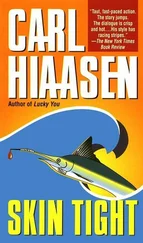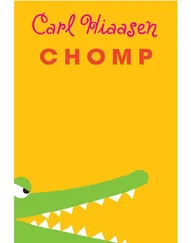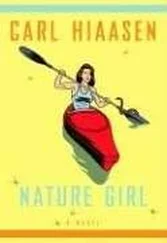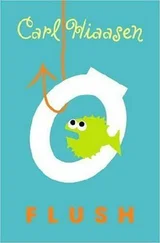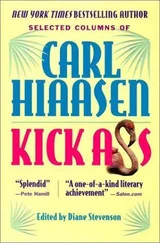Carl Hiaasen - A Death in China
Здесь есть возможность читать онлайн «Carl Hiaasen - A Death in China» весь текст электронной книги совершенно бесплатно (целиком полную версию без сокращений). В некоторых случаях можно слушать аудио, скачать через торрент в формате fb2 и присутствует краткое содержание. Жанр: Детектив, на английском языке. Описание произведения, (предисловие) а так же отзывы посетителей доступны на портале библиотеки ЛибКат.
- Название:A Death in China
- Автор:
- Жанр:
- Год:неизвестен
- ISBN:нет данных
- Рейтинг книги:3 / 5. Голосов: 1
-
Избранное:Добавить в избранное
- Отзывы:
-
Ваша оценка:
- 60
- 1
- 2
- 3
- 4
- 5
A Death in China: краткое содержание, описание и аннотация
Предлагаем к чтению аннотацию, описание, краткое содержание или предисловие (зависит от того, что написал сам автор книги «A Death in China»). Если вы не нашли необходимую информацию о книге — напишите в комментариях, мы постараемся отыскать её.
A Death in China — читать онлайн бесплатно полную книгу (весь текст) целиком
Ниже представлен текст книги, разбитый по страницам. Система сохранения места последней прочитанной страницы, позволяет с удобством читать онлайн бесплатно книгу «A Death in China», без необходимости каждый раз заново искать на чём Вы остановились. Поставьте закладку, и сможете в любой момент перейти на страницу, на которой закончили чтение.
Интервал:
Закладка:
"You would never make it to the sea without help, Thom-as. And my family will be very proud to hide you, and to help you escape, especially when they see the wonderful gift you are bringing them."
"You?"
She laughed, a mountain stream.
"Oh, they will be glad to see me, too. But it is the truck they will prize most."
"The truck."
"But… how will they account for it?"
"They will hide it while they let all other production teams know that they have saved enough money to buy a used truck. Then one day it will appear. Imagine the celebration; the other teams will be so jealous."
"I see," Stratton said in quiet wonder.
"You will be a hero, Thom-as. My hero." She slid across the seat and kissed him with flashing tongue.
They left the truck in a copse of trees on a hillside capped by an ancient pagoda. Kangmei, bubbling with the excitement of a little girl on Christmas, led him to the hilltop. It was nearly light by the time they reached the top.
"Down there," she said, gesturing to a mist-shrouded valley.
"That is Bright Star. My family lives in the houses near the school. Soon you will see."
With exaggerated care, she installed him on a bed of needles beneath some pine trees, about a hundred yards from the dirt path that wound into the valley.
"No one will see you here. Rest. My uncles and I will come back around lunchtime, when everyone is sleeping. It will be safe then for you to come down.
It's not far." She looked at him through almond eyes without end. "You will wait for me, Thom-as. Please?"
"I will wait." He hugged her. "Here, a gift for your family." He handed her the leather-yoked keys of the truck.
When she had gone, Stratton lay with his head pillowed in his arms and watched the sky turn blue. As the tension drained from him, aches replaced adrenaline.
It had been a long time since he had been this tired. Stratton surrendered to sleep.
When he awoke it was already late morning. The sun, approaching its zenith, oppressed the pine grove. It had brought sapping humidity and a winged holiday for insects of every stinging phylum. Stratton relieved himself against a tree and crawled onto an outcropping of rock that looked onto the valley, trying not to think how hungry he was.
A picturebook scene. The commune was comprised of what had apparently been four separate villages in the space of several square miles. Around each cluster of single-story wood homes well-trod dikes led to paddies of rice. In the northern quadrant lay a bright green field of what could only have been sugarcane. To the east was a well-kept citrus grove. A patchwork of small private plots lay on the fringes of the communal fields. The nearest settlement, the one to which Kangmei must have gone, was arranged around a carp pond. The only building of substance was a low, ramshackle structure with a thatched roof and a fresh coat of whitewash. Stratton decided it must be a combination school and office for the production team.
The fields and earthen streets of the village swarmed with people. Stratton watched a double file of schoolchildren, hand-in-hand, parade in a swatch of color toward a dusty soccer field where some teenagers desultorily kicked a ball.
Stratton counted two trucks and a handful of three-wheeled contraptions that looked like misshapen lawn mowers. "Walking tractors," Kangmei called them.
The scene was peaceful and, by Chinese standards, an advertisement for rural prosperity. Stratton noted the slender cable on thin poles that dropped into the hamlet and spread ancillary arms toward a few of the nearest houses; by rule of thumb in China, if electricity has spilled down to individual production teams, a commune is well off.
At the base of the hillside path there appeared a supple girl and two stocky men in peasants' garb. As they began to climb, the girl waved diffidently, a fleeting, offhand movement, like shooing flies. Kangmei had found refuge.
Stratton decided to wait where he was. Idly, he began to trace the power line out from the settlement, across the fields and back toward its origin.
It was a mistake.
In almost the precise center of the valley, sheathed in trees, lay the administrative headquarters of the commune, the hub of which the four production teams were spokes. Stratton could see a dingy white water tower and, amid shadows, the perimeter walls of what once had been the landlord's house. He made out a strip of macadam and along it some shops, a vegetable market and a fair-sized building with a half-domed roof that might once have been a 1930s movie theater.
Stratton saw without seeing the red-starred flag that hung limply from the building. He saw a chimney thrusting unnaturally from among the trees and knew without knowing that it belonged to a homespun woodworking factory that made grapefruit crates and slatted folding chairs. He saw a glint of water through the trees and knew that, except in the rainy season, the river that flowed there could be safely forded by men five feet ten or taller.
Stratton groaned aloud. In an instant of black despair, he cursed the luck that had forsaken him in rags among Chinese pines.
He rose to run.
Before him stood Kangmei. Smiling at her side were two erect, honey-colored men of late middle age with the same subtle, alluring facial structure that Kangmei had inherited.
"Thom-as," Kangmei said gravely, "these are my uncles. They will help us."
They were Zhuang, members of a race more Thai than Chinese that had settled in the southern hills in the mists of time. The Zhuang survived in modern China as the country's largest minority. Kangmei's mother was Zhuang, her father, Wang Bin, a member of the majority Han. The combination was what made her so striking. Stratton should have realized it before.
I know all about the Zhuang. They taught me that, too, Stratton wanted to yell, and wondered about his sanity.
Kangmei stared in open-mouthed concern.
"Thom-as! What is the matter? There is no danger. These are my uncles. They-"
"What is the name of this fucking place?"
"Thom-as!"
"Goddamn it. Tell me." He took an involuntary step toward the girl and the two peasants closed around her.
"I told you. We live in Bright Star."
"That's not the right name. I know. Tell me in Chinese."
The two peasants began talking angrily. Kangmei interrupted them with a stream of local dialect that seemed to mollify them.
"Thom-as, I have told them that you are feverish and hungry and very tired. But you must be polite to them, please."
"I'm sorry." Stratton grappled for composure. "Tell me the real name, please. I want to hear it."
"We live in Bright Star," she said slowly, as though instructing a slow child.
"Over there is Sweet Water, and there, Good Harvest, and there, Evergreen. Why is it so important?"
"And the place in the middle? Where the factory is, and the water tower?"
"That is where the cadres live, and some soldiers. It is not important. Our people go there only when they must-for Party discussions, to buy shoes and bicycle tires."
"What is it called?"
"It is called Man-ling."
"Man-ling, yes, Man-ling. Oh, sweet Jesus."
Stratton sank to his knees and buried his head in his hands. The peasants' hostility surrendered to concern. Kangmei sprang to his side.
"Thom-as, do not weep. Come, you will be safe. My aunts will cook special food.
There is a warm bed and a doctor for your leg. Yes, a doctor… you can trust him. He is a friend of my uncles'. Come, please. It is not far to walk."
"I can't. I must not."
"Please, Thom-as. Please. Soon there will be too many people. Already there are rumors about things that happened last night… Please."
"No. No. No," Stratton muttered in an anguished litany that was a warrior's penance.
Читать дальшеИнтервал:
Закладка:
Похожие книги на «A Death in China»
Представляем Вашему вниманию похожие книги на «A Death in China» списком для выбора. Мы отобрали схожую по названию и смыслу литературу в надежде предоставить читателям больше вариантов отыскать новые, интересные, ещё непрочитанные произведения.
Обсуждение, отзывы о книге «A Death in China» и просто собственные мнения читателей. Оставьте ваши комментарии, напишите, что Вы думаете о произведении, его смысле или главных героях. Укажите что конкретно понравилось, а что нет, и почему Вы так считаете.

